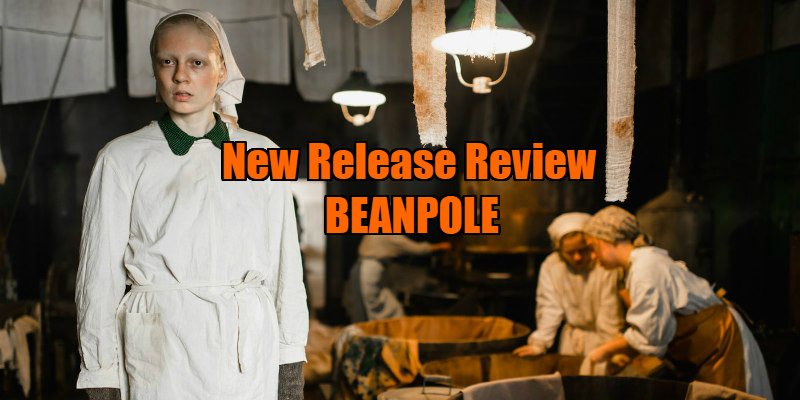
Review by Benjamin Poole
Directed by: Kantemir Balagov
Starring: Viktoria Miroshnichenko, Vasilisa Perelygina, Andrey Bykov, Igor Shirokov

Beanpole, the second film from Russian wunderkind Kantemir Balagov, begins with the plaintive screen card: "Leningrad: first autumn after the war." These six words encapsulate the exhausted essence of this strange and powerful film, with the adjectival phrase furthermore implying that the ugliness we are about to witness is only the beginning of the Soviet Union’s long road to recovery. Filtering the aftermath of one of the world’s longest and most harrowing sieges through the post-war experiences of two young women, Beanpole moves as if through a (disturbingly beautiful) fog, creating a soporose effect which in itself leaves the audience in a state of stultification, sympathising with the PTSD that designates the film’s characters.


We open in silence on an inelegant close-up of the titular Beanpole (Viktoria Miroshnichenko - all awkward angles and gangling ambulation), who has "blacked out," a sudden compulsion which involves her staring straight ahead until the impulse has passed. The people who surround her at the hospice where she works are used to these moments, and carry on as normal; after all, Beanpole’s moments of creepy stagnancy are paltry compared to the various walking wounded and paraplegics that make up the hospital’s clientele. Our other lead is Masha (Vasilisa Perelygina), whose relative confidence is a foil to Beanpole’s spaced out mien. Finally, there is a young boy, ostensibly Beanpole’s child, whose father is seemingly absent.

Balagov’s film seems to slow time itself, by producing sequences that become almost introspective in their extended endurance: Beanpole and child catch a tram, and the little boy watches and watches as the various townsfolk leap onto the back of it attempting to cadge a lift. In a sequence of prolonged naturalistic affection, Beanpole washes the child by warm candlelight. Kseniya Sereda’s cinematography swathes the screen in vibrant shades of red and green, a bold pantone that contrasts the destitution of Leningrad and repositions our cultural understanding of what would one day become Saint Petersburg: perceptions derived from black and white war photography, worn down by the staccato representations of combat shot with muddy, 45 degree shutter speeds. There is no urgency in Balagov’s movie: the characters have all the time left in the world to mourn their losses and to vainly attempt a reconfiguration of their positions within a ruptured and ruined society.
[ READ MORE: New Release Review - Long Day's Journey Into Night ]
For some, even, such redemption is unavailable. For the grimly wounded men in the hospice, whose wounds refuse to heal and who beg for euthanasia, life is akin to the stasis Beanpole periodically suffers. A groundhog day of changed sheets and kind, hopeless smiles from the untrained nurses. Throughout the film’s patchwork narrative, Beanpole and Masha oscillate between a sort of punch drunk rhapsody and inevitable despondency: the red/green colour scheme visualising the insistent push/pull ambience of survival, wherein life is supercharged because the stayers have escaped death, but are yet still faced with the dreadful consequences of the war. There is nothing to lose, but at the same time there is seemingly nothing to gain, either. In one sequence of astonishing eroticism, an immobilised patient requests a midnight cigarette. Beanpole obliges by giving him a series of gentle blowbacks, the nicotine smoke brushing against his lips in delicate silken gasps, the camera lingering for so long that it begins to feel indecent. Later, there is an attempted lesbian tryst between our leads which is a disaster, both parties seeming to give in to the inevitability of the circumstance rather than sincere emotion.


Like the alienated protagonists, Beanpole leaves its audience in a state of displacement which is near narcotic in its hypnotic insistency. Despite the red and green mise-en-scene, the snow, and the occasional moments of warmth and hope, I’d leave it until after Christmas, though. A deeply devastating film.

Beanpole is on MUBI UK now.
"Seberg is being marketed as a conventional biopic, but it's closer to something like Once Upon a Time in Hollywood."— 𝕋𝕙𝕖𝕄𝕠𝕧𝕚𝕖𝕎𝕒𝕗𝕗𝕝𝕖𝕣.𝕔𝕠𝕞 🎬 (@themoviewaffler) December 22, 2019
SEBERG is in UK/ROI cinemas January 10th.
Read @hilliseric's reviewhttps://t.co/mxcCSPQkMz pic.twitter.com/FkQDYFwIu3

